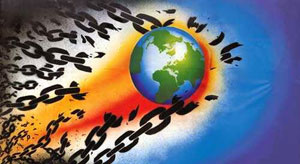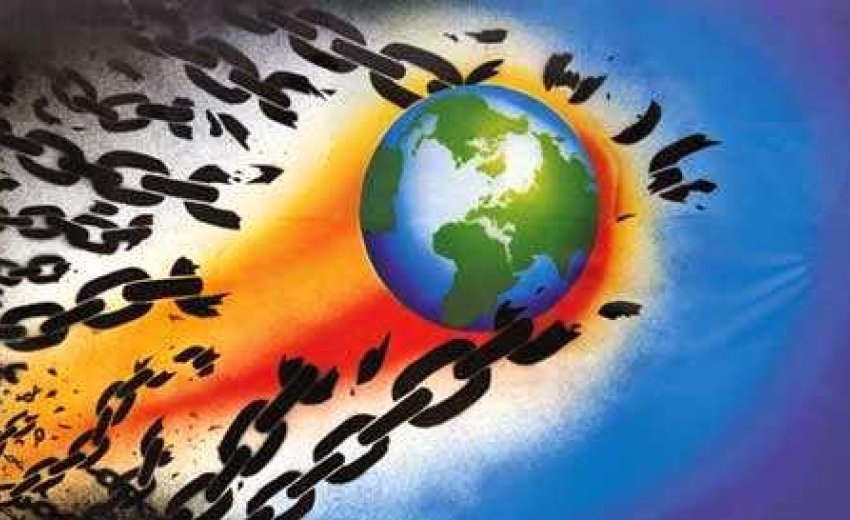 In a recent conversation Guruka Singh of SikhNet proposed a special commemoration on 30
years of the cataclysmic events of 1984. A brief but telling theme: “Honor the fallen, heal the
living.” I liked it so much I was tempted to steal it for the title of this column today.
In a recent conversation Guruka Singh of SikhNet proposed a special commemoration on 30
years of the cataclysmic events of 1984. A brief but telling theme: “Honor the fallen, heal the
living.” I liked it so much I was tempted to steal it for the title of this column today.
In 1984 I was safe and sound in the good ole U.S. of A with very little connection to the political shenanigans in India – having come from there 24 years earlier. (Today is another 30 years further along.) I learned of the realities of 1984 from narratives of witnesses and survivors, as also from published statistics and reports. And I have written an essay on the topic pretty much every year since.
It is 65 years since the India-born Eric Blair writing under the nom de plume George Orwell gave the world a fictional but haunting account of a despotic government and its citizenry that had all sense of a free people squeezed out of it.
It is 30 years now since the government of India, arguably the world’s largest functioning democracy, turned the fundamental purpose and principle of representative government on its head and unleashed a reign of terror on a small minority within its borders. The Indian government inadvertently immortalized the year 1984 in an ironic tribute to the prophetic George Orwell.
A whole generation of Sikhs, Indians and other inhabitants of the world have come and gone; the memories remain.
First, in June 1984 the Golden Temple complex (Harmander) at Amritsar was attacked by the Indian Army and the Akaal Takht destroyed; the number killed and maimed remains a mystery even today. Then less than five months later over 2,700 Sikh men, women and children were brutally murdered in India’s capital city of Delhi within 48 hours (These numbers come from the Indian government.) – better than one a minute – while the police looked on or abetted the crimes and the army stayed in its barracks. This mayhem was conducted by organized armed gangs at the behest of political leaders of the ruling government. Of course, Sikh sources are certain that the numbers killed or burned alive, raped and injured were much larger by a magnitude. And now 30 years and eleven judicial inquiries later the politicized bureaucracy and judiciary of India found less than a handful guilty.
Keep in mind also that Delhi was not the only venue; mobs with anti-Sikh murderous frenzy did their work in many cities across India. There was no spontaneity to the violence. Riots they were not. That’s why we Sikhs label 1984 as the time of attempted genocide akin to the holocaust, even though much smaller.
The events, causes and cure are obvious and we have talked them to death. There are books galore and the Internet provides a surfeit of information. I will sidestep them today. Thirty years are a witness: Justice has been immune to the facts but not immune to status, wealth, pelf or political power of the guilty.
Minorities have historically had a precarious existence in independent India be they Muslims, Sikhs or Christians, et al. Sikhs are and will remain a minority no matter where they live, even in India.
But Sikhs have a special place in India’s history that rulers of modern India seem ignorant about. Better than two-thirds of all who were imprisoned or hanged by the British during India’s struggle for independence were Sikhs. They have been the backbone of India’s armed forces in its several wars with Pakistan and China. The Punjabi farmer (Sikh and Hindu) produced the Green Revolution that transformed India from a nation that had yearly famines to one that could feed its teeming billion and even export food.
But no matter how grave the injustice a people have to come together again or the nation risks fragmentation. Keep in mind that the number of killed and maimed Sikhs is smaller than it could have been because many were saved by their Hindu neighbors and friends.
Unquestionably we need to move forward.
Until last month, for the past 8 years India had a government headed by a Sikh, Manmohan Singh, an internationally-acclaimed economist; the ruling political party was headed by Sonia Gandhi who was raised Roman Catholic. For the first time, a Sikh General J.J. Singh, headed India’s army, and now there is another, General Bikram Singh. India’s genius of economic planning is also a Sikh – Montek Singh Ahluwalia. These are all remarkable “firsts” in modern India. For the first time in its history, the governing structure of India seems multireligious, as it ought to be in any secular democratic nation.
Much has changed in India and the world but just as much remains tied to an unhealthy past. Investigative reports are like the canary that coal miners carry into the mine-shafts with them. The canary warns them of unsafe air. These reports speak to the health of the Indian body politic. The canaries have sung their song. Actions must follow words.
In the 1990s, Yugoslavia and South Africa, both emerging out of a period of horrendous human rights violations, confronted their past by appointing “Truth and Reconciliation Commissions.” Without such action a government’s credibility is at risk -- internally with its own citizens, and externally with the international community. Also due to neglect, the historical record gets lost or tainted.
We, too, need to preserve history and to shift the focus of human rights in India from rhetoric to the healing power of truth and reconstruction.
 How then to commemorate 1984 so that it makes a positive difference in the world, to India, and
to Sikhs.
How then to commemorate 1984 so that it makes a positive difference in the world, to India, and
to Sikhs.
These are matters that happened three decades ago. Isn’t it time to move on and not become prisoners of our past? To move forward we must put the past behind us. Confession and atonement must precede redemption. These will free the sinners as well as those that are sinned against of the inner burden that they carry.
Prime Minister Manmohan Singh took the first step of confession when he offered the nation’s regret and apology in the Indian parliament; atonement and justice still wait. Such actions don’t come easy to governments. Just look at the case of the 120,000 Japanese interned in America during the Second World War. An apology came 50 years later from President Bill Clinton.
Our oral history needs to be preserved, like the Jews have being doing with theirs. I propose a Sikh Research & Documentation Center affiliated with a University.
Let us collaborate with museums to establish appropriate exhibits, and with universities to preserve the historical record -- oral history, recordings, relics, visual artifacts, correspondence, reports and personal recollections. And ensure that the material is available to researchers of any bent – particularly to those who deny that such atrocities ever occurred.
India now tells us that 1984 was a mere blip on the stellar record of the world’s most populous democracy that happened 30 years ago. The past will only hold us back, they say. The new mantra is that India is now on a fast track of moving forward and no one and no nation can tie India down.
This is the same old litany of half-truths and distortions. It is not a measure of moving forward. The history, the attempted genocidal killings, the 11 commissions in 25 years! To put all this aside is not a measure of moving forward.
Yet, we must move forward. The ball and chain of the past will not save us. The past is a prologue to the future. Without this connection we become an untethered balloon floating off to somewhere we may not want to go. But the past must not hold us back fixed in one place in time or space.
World opinion would likely not come to our aid. Global realities and geopolitics tell us so. India is the only feasible counterweight to China’s growing heft in Asia. Also, we need to keep the Islamic world in check – it sits astride the world’s oil resources and has access to a nuclear arsenal. India is ideally suited geographically and strategically to help manage the stalemate. Yet, to deny the logic of the injustice done to the Sikhs is Orwellian. It does not wash. To establish a Research & Documentation Center is moving forward. A Truth & Reconciliation Process is moving forward. To move beyond such horrendous sins requires that we face them, acknowledge them and atone for them. And then we carry forward the lessons learned.
How to accomplish all that?
The Indian judiciary, though complicit, can deliver a modicum of justice. We need to cultivate international human rights organizations. Progress will come albeit slowly.
“Truth & Reconciliation Commission” requires some truth and a lot of honesty, no matter how embarrassing. This could even be liberating. Many nations – Sierra Leone, Argentina, Bolivia, Guatemala, El Salvador, Chile, Timor and Peru, even Sri Lanka have trod this path. India needs to.
From such a step, honestly undertaken, neither the Indian government nor the Sikh leadership is likely to emerge unscarred.
Thirty years later how best to honor the fallen and heal the living? I would say: Years from now, historians will reconstruct history from what we said and did today. Never let the story die.
